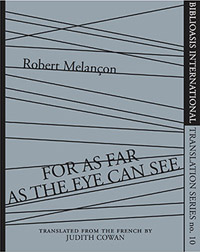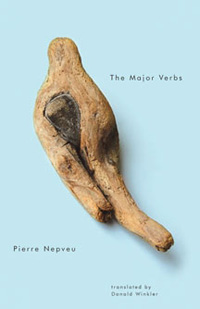Reviews
Poetry Reviews by Marie Vautier
Robert Melançon, For as Far as the Eye Can See, translated by Judith Cowan (Windsor: Biblioasis, 2013). Paperbound, 152 pp., $19.95.
Pierre Nepveu, The Major Verbs, translated by Donald Winkler (Montréal: Signal Editions, 2012). Paperbound, 92 pp., $18.
 Judith Cowan’s translation of For as Far as the Eye Can See, is a well-rendered, sensitive work that captures the spirit and voice of Robert Melançon’s Le Paradis des Apparences: essai de poèmes réalistes (2004). Melançon, formerly a professor of Renaissance literature at the Université de Montréal, has advanced the study of poetry in multiple ways: a column in Le Devoir; articles in Québécois academic journals such as Liberté and Voix et Images; and participation in Radio-Canada’s En Toutes Lettres. His work is recognized as original and allusive; it presents, as the subtitle of the French text intimates, a new view on ordinary sights in an unnamed city which can be recognized as Montreal.
Judith Cowan’s translation of For as Far as the Eye Can See, is a well-rendered, sensitive work that captures the spirit and voice of Robert Melançon’s Le Paradis des Apparences: essai de poèmes réalistes (2004). Melançon, formerly a professor of Renaissance literature at the Université de Montréal, has advanced the study of poetry in multiple ways: a column in Le Devoir; articles in Québécois academic journals such as Liberté and Voix et Images; and participation in Radio-Canada’s En Toutes Lettres. His work is recognized as original and allusive; it presents, as the subtitle of the French text intimates, a new view on ordinary sights in an unnamed city which can be recognized as Montreal.
The work follows a set format: there are 144 poems, each composed of twelve lines (tercets, no quatrains). In “Sonnet 36,” the poet lays bare his “philosophy”: “It all has to fit into twelve lines—a lesser sonnet— / all that’s depicted at every instant inside the cave / dug out by Plato for the chaining up of those / whom he deemed to be dupes of illusion. But […] I shall settle for the paradise of what I see / I trace this rectangle of twelve lines and / make of it a window through which to observe / all that appears, and that happens once only.” This “lesser sonnet”—the Beaudelairian “sonnet allégé”—offers portraits of quotidian views: from the poet’s window, from his walks in the neighbourhood, from his acute and sensitive observations of the passage of time and light as the days and seasons change. The focus is on a different way of seeing, perhaps comparable to the paintings of Alex Colville: many poems describe objects or cityscapes, and then gently lead to a deeper analysis of those realities. The entire collection has a remarkable unity of tone and thematics, despite the fact that among the descriptions of “housefronts engulfed in the dark” and “murmurs pouring from the open window,” there are metafictional meditations on the difficulties of “build [ing] up a monument as fragile as the grass,” multiple (and, to my mind, jarring) references to mainly European painters and philosophers (as well as a predilection for the music of Glenn Gould), and poems that alternate among seasons, settings and subjects. Melançon is known as an “urban” poet, but the quasi-indescribable haunting effect of these poems comes from the seizing of the cityscape via “the country”—the presence of nature is highlighted on practically every page: “A wine-red sun smears the sky’s canvas; / what a perpetually repainted ceiling it is, / this vulgar decor above the ashen streets” (“Sonnet 57”). This sometimes melancholy vision leads to metaphysics: “Along cracks in the asphalt run threads of grass/whose pattern may spell out the inconceivable/name of God, or the shape of the world” (“Sonnet 88”). Cowan’s impressive translation retains the tone set by Melançon: she changes verb tenses, expressions (“un écolier qui ne sait pas sa leçon: a schoolboy whose homework isn’t done”), and very occasionally, an image (“Sur la chausée se ramifie un entrelacs / Dans lequel volent des ombres d’oiseaux”: “over the roadway is a tracery of branches / with the shadows of birds flying through), but like the “old masters” of “Sonnet 95,” her choices of vocabulary and rhythm “apply such touches, / by means of which / reality might be recognized.”
Pierre Nepveu is a well-known poet, novelist, critic, and cultural commentator. A retired professor of Québécois literature (Université de Montréal), he is one of the leading figures of the Montreal literary scene. Three-time winner of the Governor-General’s award—twice for poetry and once for literary/cultural analysis—he is also, like Robert Melançon, the recipient of major Québécois literary prizes, such as the Prix Athanase-David.
The Major Verbs (Les Verbes Majeurs, 2009) is divided into four parts: a long  reflection on a cleaning woman observed in the metro, “The Woman Asleep in the Subway”; a meditation on “Stones on the Table,” which moves from that very concrete image to a discussion of universal themes in relationships; “Exercises in Survival” (2003), in memory of the poet’s parents, presents the major verbs of the title: “to be born, to grow, to love, / to think, to believe, to die”; and a short final piece, “Song for a Passage,” marked “Arizona, October 2005.” These sections have very different foci, but all display Nepveu’s abiding interest in multiple cosmological systems and deep and sometimes ambivalent relationships, along with empathy for sufferers, and a reluctant acceptance of grief and of the imperfections of the world. The long initial poem lays bare the poet’s extensive but ultimately unsuccessful efforts to invent a better world (of the imagination) for the exhausted cleaning woman, leading both the woman and the reader to “what’s nakedly real / under stuporous fluorescents.” The third section’s autobiographical slant illustrates the conflict of belief systems between the poet and his parents: while the father “opts for the joys / of a peopled infinity,” the poet throws “in his face / [his] atheist dogma / and [is] made gentle by his fear.” The intensity with which certain images convey the complexities of human beings’ existence: (“we who are nothing / but the hollow where the world babbles / the infinitely small core that contains all”) underlines the poet’s efforts to change the unchangeable, and to express the ineffable. In the “high altitudes of grief,” the poet is “a mouth smothered by its own words,” but at the end of the work, away from his “north-east life” in the Arizona desert, the poetic voice is rediscovered: “I spoke to you, juniper / and you found my voice / vibrant and cavernous / you found its echo disturbing.” Nepveu’s propensity for internal rhymes, a definitive French rhythm, action verbs and multisyllabic words is hard to translate, and in my opinion this award-winning English collection (Governor-General’s Award for Translation in 2013), does not always render the tone of the original text. For example, in the context of the stones on the table, “Je les conserve à portée de vie / en tournant le dos aux révolutions, / vieilles pourvoyeuses d’âme, / mais les cailloux ne parlent que de l’eau” is rendered as “Wary of revolutions / those old soul peddlers, / I kept them within lifeshot— / yet the pebbles speak only of water.” The economy of language practised by Winkler sometimes affects the cadence of the original work, reducing its dimension of the sacred. Nonetheless, it makes available this complex text to an anglophone readership.
reflection on a cleaning woman observed in the metro, “The Woman Asleep in the Subway”; a meditation on “Stones on the Table,” which moves from that very concrete image to a discussion of universal themes in relationships; “Exercises in Survival” (2003), in memory of the poet’s parents, presents the major verbs of the title: “to be born, to grow, to love, / to think, to believe, to die”; and a short final piece, “Song for a Passage,” marked “Arizona, October 2005.” These sections have very different foci, but all display Nepveu’s abiding interest in multiple cosmological systems and deep and sometimes ambivalent relationships, along with empathy for sufferers, and a reluctant acceptance of grief and of the imperfections of the world. The long initial poem lays bare the poet’s extensive but ultimately unsuccessful efforts to invent a better world (of the imagination) for the exhausted cleaning woman, leading both the woman and the reader to “what’s nakedly real / under stuporous fluorescents.” The third section’s autobiographical slant illustrates the conflict of belief systems between the poet and his parents: while the father “opts for the joys / of a peopled infinity,” the poet throws “in his face / [his] atheist dogma / and [is] made gentle by his fear.” The intensity with which certain images convey the complexities of human beings’ existence: (“we who are nothing / but the hollow where the world babbles / the infinitely small core that contains all”) underlines the poet’s efforts to change the unchangeable, and to express the ineffable. In the “high altitudes of grief,” the poet is “a mouth smothered by its own words,” but at the end of the work, away from his “north-east life” in the Arizona desert, the poetic voice is rediscovered: “I spoke to you, juniper / and you found my voice / vibrant and cavernous / you found its echo disturbing.” Nepveu’s propensity for internal rhymes, a definitive French rhythm, action verbs and multisyllabic words is hard to translate, and in my opinion this award-winning English collection (Governor-General’s Award for Translation in 2013), does not always render the tone of the original text. For example, in the context of the stones on the table, “Je les conserve à portée de vie / en tournant le dos aux révolutions, / vieilles pourvoyeuses d’âme, / mais les cailloux ne parlent que de l’eau” is rendered as “Wary of revolutions / those old soul peddlers, / I kept them within lifeshot— / yet the pebbles speak only of water.” The economy of language practised by Winkler sometimes affects the cadence of the original work, reducing its dimension of the sacred. Nonetheless, it makes available this complex text to an anglophone readership.
—Marie Vautier









